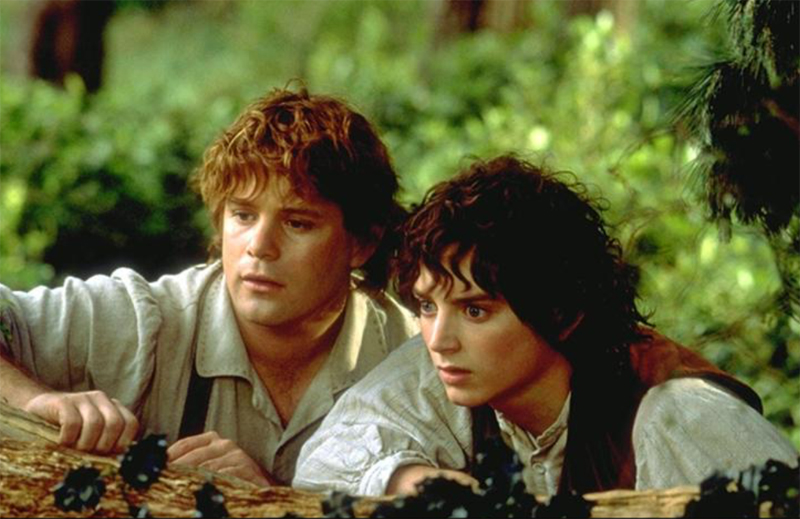
(Torstar file photo)
Hobbit friends Samwise Gamgee (left) and Frodo Baggins in Peter Jackson’s film version of Lord of the Rings.
(The Hamilton Spectator – Saturday, July 27, 2024)
Today let’s talk about friendship. And hobbits.
You know hobbits. Short. Stout. Big, hairy feet. Colourfully-dressed, fun-loving, pipe-smoking lovers of food and drink. Living in the shire in homes with round doors. And courageous, they are, beyond measure.
Consider Frodo Baggins and his dangerous journey. He told his hobbit friend Samwise Gamgee that he’s leaving to go on it alone. “Of course, you are,” Samwise replied. “And I’m coming with you!” If only we all had such friends. If only we could be one.
It’s good to consider because Monday “The Lord of the Rings” turns 70. It was July 29, 1954 when J.R.R. Tolkien’s “Fellowship of the Ring” published. Soon after Tolkien published two more in the series and the trilogy eventually became among the best-loved stories of modern times.
For the uninitiated, it involves a sort of anti-quest. It’s a journey, to be sure, but rather than a quest to find or capture much, it involves relinquishing. Giving up. Laying down.
Frodo, an imperfect yet innocent hobbit, leaves home (never easy for any hobbit), and travels through various places and dangers with both friends and monstrous enemies towards Mount Doom to destroy the magical ring he’s carrying – “one ring to rule them all” – to save, well, everything.
Frodo journeys like any of us, really, while the story unwinds and explores good and evil and death and immortality and suffering and so much to chew on. Then there’s addiction to power, which, considering today’s political headlines, is as relevant as ever.
But the underpinning that sets Tolkien’s absorbing work apart is friendship, the simplicity and sincerity and honesty in various friendships among different characters. When Frodo finally nears Mount Doom but can’t go on, Samwise says while he can’t carry the ring for Frodo, he can carry Frodo. So he does. He picks up his friend and carries him. That’s hobbit friendship.
We know it’s always easier to kiss the ring of power – did I mention today’s political headlines? – than destroy that ring. It’s tempting to also view friendship as just a form of constant validation. But Hobbit friends think differently. They think like the ancient proverb, “As iron sharpens iron, so a friend sharpens a friend.”
They’re dedicated to each other’s greatness. They’ll show a friend’s blind spots in a way that makes that friend a better version of themselves, like a good gardener (hobbits love gardening) prunes a plant. They neither let it go wild, nor overcut it. They allow room for natural growth.
Which, it seems to me, fits hand-in-glove with family life. In fact, funny-enough, the children’s mother and I share the July 29 “Lord of the Rings” anniversary as our wedding anniversary. Gosh.
The “Lord of the Rings” books, not including the 1937 prequel, “The Hobbit,” have now sold about 150 million copies. It’s extraordinary for a hefty read of some 500,000 words. Peter Jackson’s movies of the trilogy, meanwhile, have grossed almost $3 billion. And won 17 Oscars.
Not surprisingly, Tolkien’s work also produces a steady stream of literary and academic commentary. Locally, at the Albert M. Wolters Centre for Christian Scholarship at Redeemer University, a two-day conference on Tolkien is coming in September.
Which is to say that good stories, like good friends, whether they’re 70 or 770, are always in fashion. The best ones challenge and nourish us, both, in this case through the counter-cultural notion of relinquishing control. In this is literature and life, both, this reflection of Tolkien’s deep Christian faith.
Tolkien had his own close friends. He often met with the so-called Inklings – fellow writers and Oxford professors that included C.S. Lewis and Charles Williams – to nourish his own life and spirit. There’s a lesson here, also.
We don’t have to be a venturesome hobbit way off in Middle Earth somewhere to be on a sacred journey. Even a little person (especially a little person) can do that right here.

Thanks, Thom, for another good column!
Congratulations on your wedding anniversary, Thomas.
This was an excellent article about the missing ingredient in most men’s lives — unfortunately.
What can we do to change the picture? Perhaps, find a mentor…or mentee.
Yes, agreed. Thank you, Marvin.
And thank you, TC, for reading!